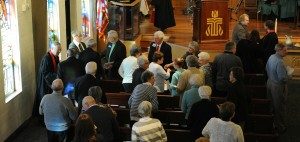Who are Presbyterians?
The word Presbyterian comes from the Greek word presbuteros which means elder, and is the basis of the representative form of church government found in the Presbyterian church. Presbyterians are a church of much diversity, however there are certain characteristics that are exhibited in Presbyterians. Presbyterians are distinctive in two major ways:
1) A form of government that stresses the active, representational leadership of both ministers and church members.
2) Reformed Theology. Theology is a way of thinking about God and God’s relation to the world. Reformed theology evolved during the 16th century religious movement known as the Protestant Reformation. It emphasizes God’s supremacy over everything and humanity’s chief purpose as being to glorify and enjoy God forever.
The Brief Statement of Faith contains a summary of Presbyterian belief. Additionally, a basic primer to the Presbyterian Church can be found here as well as some history about the Presbyterian Church.
Beliefs of Presbyterians

The Bible – The Bible is the inspired word of God and is the most authoritative source of faith and practice for all people. God – God is the Creator of the Universe.
Jesus – Jesus is the incarnation of God on earth.
The Church – The Church is a universal company of Christ’s followers.
Holy Spirit – The Holy Spirit is the presence of God in the world and in the believer.
Sin & Salvation – Forgiveness of sin is made possible by the sacrificial death of Jesus for our shortcomings.
Sacraments – Presbyterians have two sacraments: Baptism and Communion.
In Baptism we are united with Jesus Christ and become members of God’s family, the Church. Baptism is a public confession made in the presence of others. Baptism in other churches is acknowledged by the Presbyterian Church. During Baptism we, as members of the congregation, promise to raise and nurture children in faith.
Communion, also called the Lord’s Supper, Holy communion, or the Eucharist is a time for renewing faith and strengthening ourselves for the duties and privileges of Christian service. In communion we reconcile ourselves to God and neighbor. The bread and wine symbolize the sacrificial body and blood of Christ and remind us of the last meal Christ shared with the disciples. The bread and wine symbolize the New Covenant between God and all people.
Worship – includes prayer, music, Bible reading and a sermon based upon scripture. The Sacraments, a time of personal response/offering, and a sharing of community concerns are also parts of worship.
Creeds and Confessions – Creeds and Confessions are statements which express the beliefs of a church or congregation. Confessions and Creeds are the first part of the Constitution of the P.C. U.S.A. The Book of Order is the second part. Creeds include: The Apostles’ Creed, Nicene Creed, Scots Confession, Heidelberg Catechism, Second Helvetic Confession, Westminster Confession of Faith, Shorter Catechism, Larger Catechism, Theological Declaration of Barmen, Confession of 1967, and A Brief Statement of Faith.
More about the beliefs of Presbyterians can be found at the PCUSA website.
You can also download a copy of the Book of Confessions (Part 1 of our Constitution) here.
Structure of the Presbyterian Church
The organization of the local church is spelled out in The Book of Order (Part 2 of our Constitution) and is based on several vital principles:
1. The Headship of Christ – Christ alone is Lord of the church. Everyone else in the Body is under Christ and regarded as of equal status and value.
2. The Priesthood of All Believers – Responsibility for ministry is given not just to pastors but to every member of the church, each of whom we believe to be gifted by the Holy Spirit for the work of God’s Kingdom and the building up of the Church.
3. Ordination to Service – Certain individuals are set-apart (ordained) as church “officers.” Their role is to serve the church, not lord over it. These officers have particular tasks: deacons (works of mercy), elders (administrative/pastoral oversight), and pastors (preaching/teaching/service of the sacraments).
4. Representative Democracy – Each officer of the church is elected by the people they serve (the congregation), for a term of three years. Pastors usually serve a longer period, but also by vote of the congregation. Any church member is eligible for election to office. At the congregational level, each church is governed by a board called the “Session,” which is made up of active elders and pastors.
5. Connectionalism – We have intentional and covenantal “connections” with other Presbyterian churches with whom we partner in ministry and in church discipline. Through elected representatives, we participate in higher governing and ministering bodies focused on local (Presbytery), regional (Synod), and national/international (General Assembly) concerns.
6. Constant Reformation – We believe that the Church is ever in need of vigilance lest we stray from the will of God declared in Scripture. For this reason we have procedures that allow for amendments to our Constitution and to our congregational By-Laws that will enable us to be more faithful to God’s call.
Eastridge belongs to Homestead Presbytery and the Synod of Lakes and Prairies.